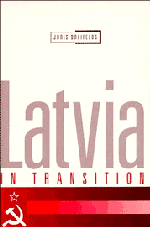Book contents
- Frontmatter
- Contents
- List of table
- Acknowledgments
- Introduction
- 1 Historical residues and impact on present-day politics
- 2 The Latvian national rebirth
- 3 Regaining independence – establishing democracy
- 4 Economics and reform
- 5 Demography, language and ethnic relations
- Conclusion
- Notes
- Select bibliography
- Index
Introduction
Published online by Cambridge University Press: 01 June 2011
- Frontmatter
- Contents
- List of table
- Acknowledgments
- Introduction
- 1 Historical residues and impact on present-day politics
- 2 The Latvian national rebirth
- 3 Regaining independence – establishing democracy
- 4 Economics and reform
- 5 Demography, language and ethnic relations
- Conclusion
- Notes
- Select bibliography
- Index
Summary
Latvia: a building block for comparisons
After the collapse of the Soviet Union, fifteen truly sovereign countries emerged claiming their right to statehood and to their own approaches to development. Freed from the tutelage of central control they have chosen varying paths and different speeds of political, economic and structural evolution. The directions taken by these former Soviet republics offer an unparalleled opportunity for comparisons – especially because of their shared point of departure from a Soviet environment.
To be sure, the exposure to common Soviet rules and practices did not prevent the existence of vast differences between the republics in economics, educational levels, demography, political culture and other important social variables. Even their paths to independence, attitudes to Communist power and relationships to each other have not been identical.
The gamut of differences in the development of the republics after the breakup of the Soviet Union is indeed very wide. The use of violence in the Caucasus, Moldava, Tadzhikistan and Russia is one of the most visible demarcation lines. The approach to economic reforms is another. The Baltic republics have most closely embraced the “shock therapy” method of change. The Ukraine had still not started on this road by early 1995 and Russia had followed a path somewhere between that of the Baltic republics and the Ukraine.
- Type
- Chapter
- Information
- Latvia in Transition , pp. 1 - 19Publisher: Cambridge University PressPrint publication year: 1996
- 1
- Cited by



